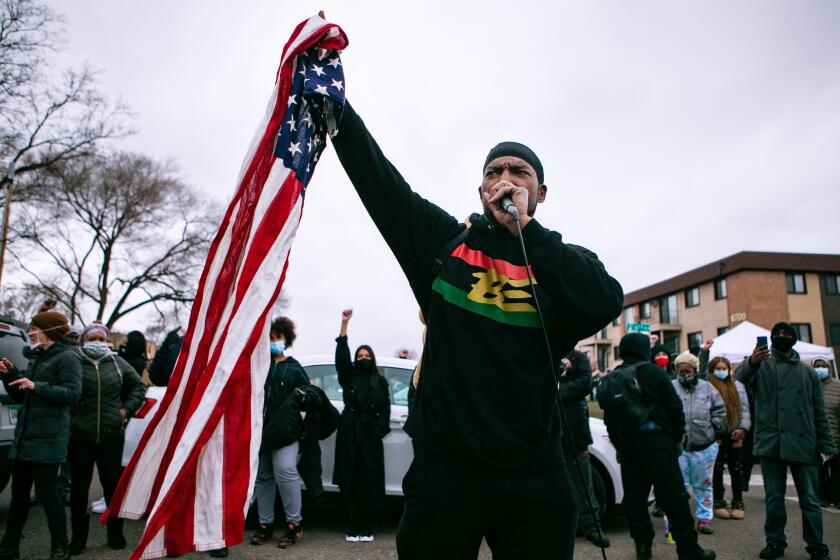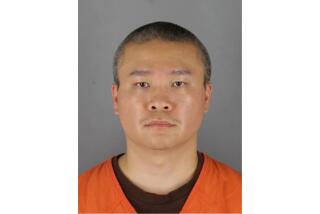‘It’s not enough’: Residents react to charge against former Minnesota officer in killing of Daunte Wright
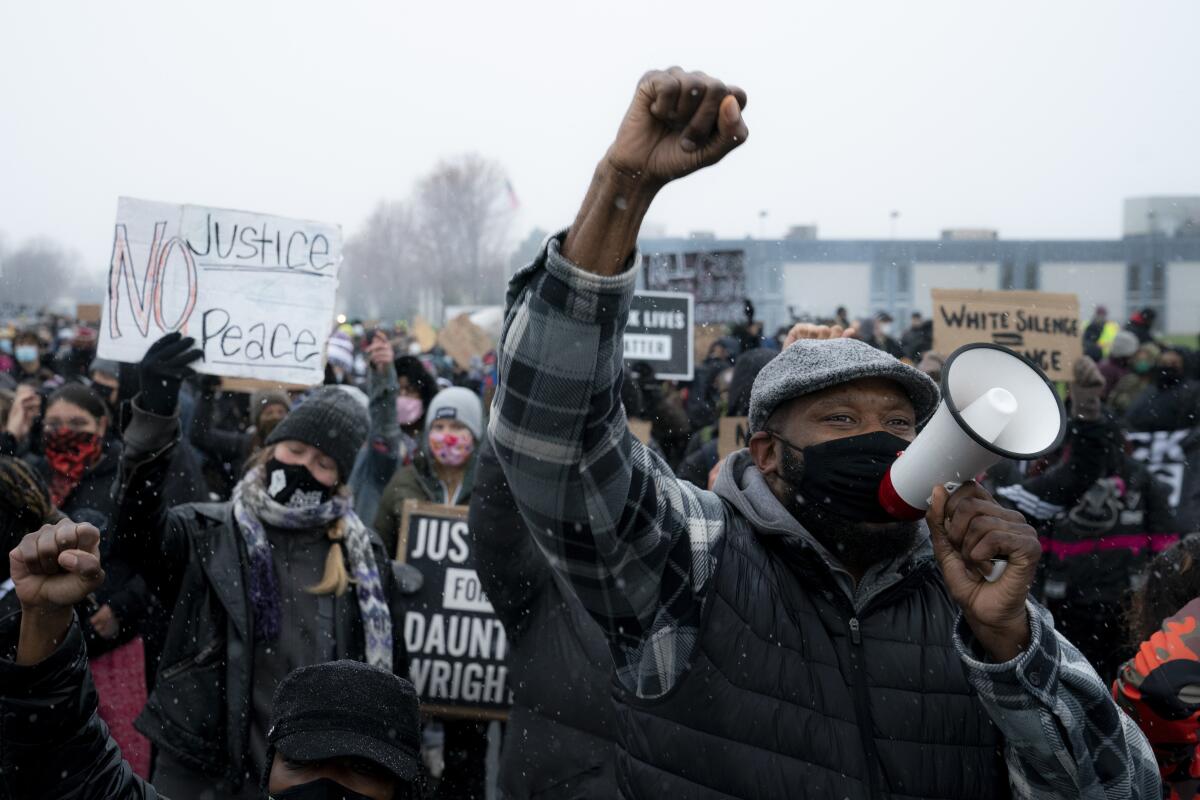
- Share via
BROOKLYN CENTER, Minn. — The prosecutors of a suburban Minneapolis county charged the former officer who shot 20-year-old Daunte Wright with second-degree manslaughter on Wednesday — a swift legal move that some characterized as overly lenient after another Black man’s death at the hands of police.
Officials from the Washington County Attorney’s Office announced the charge against Kim Potter, who had resigned a day earlier from the Brooklyn Center Police Department. The veteran officer was arrested and booked into jail, but was later released on $100,000 bail. The charge carries a maximum penalty of 10 years in prison.
Ten miles from where Potter shot Wright, former Minneapolis Police Officer Derek Chauvin is on trial on murder and manslaughter charges in the May 25 death of George Floyd, whose neck he knelt on for more than nine minutes.
Imran Ali, Washington County assistant criminal division chief and director of the major crime unit, said in a statement about the charge against Potter: “Certain occupations carry an immense responsibility, and none more so than a sworn police officer.”
“With that responsibility comes a great deal of discretion and accountability. We will vigorously prosecute this case and intend to prove that Officer Potter abrogated her responsibility to protect the public when she used her firearm rather than her taser,” the statement said.
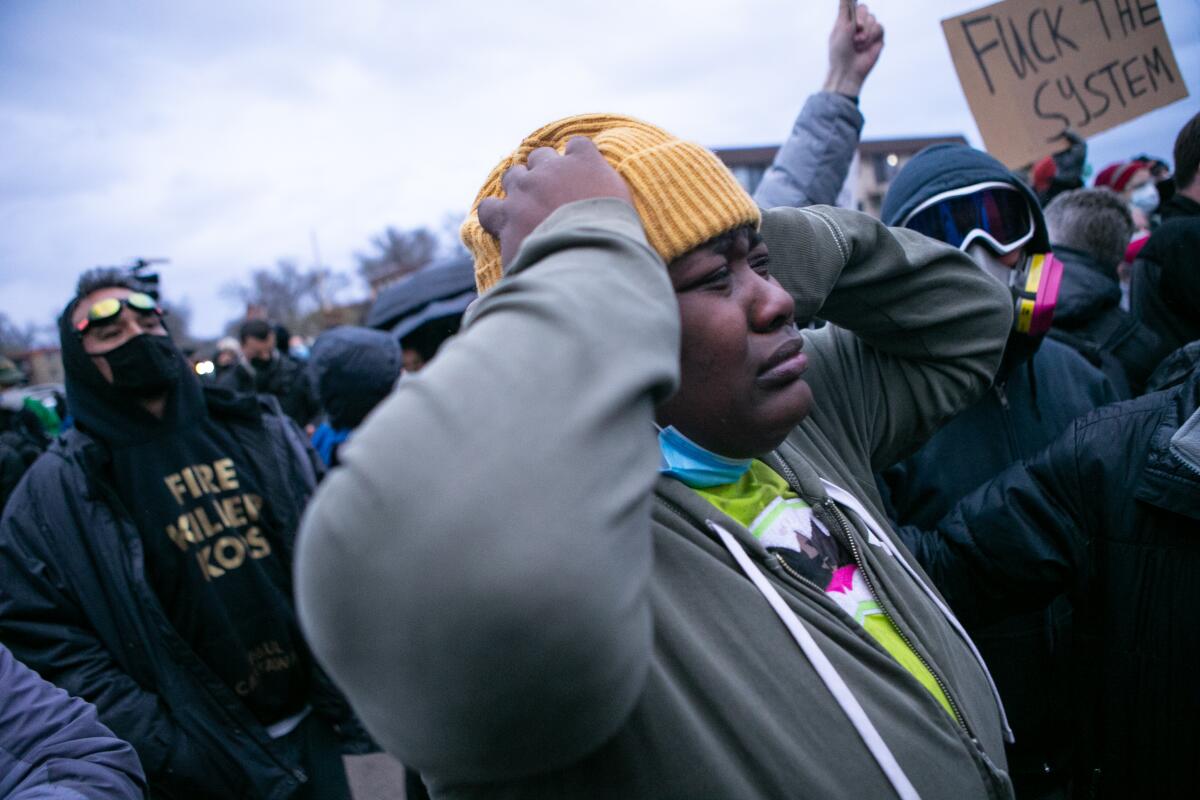
Benjamin Crump, a civil rights attorney representing the family, said that “while we appreciate that the district attorney is pursuing justice for Daunte, no conviction can give the Wright family their loved one back.”
“This was no accident. This was an intentional, deliberate and unlawful use of force,” Crump added. “Driving while Black continues to result in a death sentence.”
Prominent local civil rights attorney Nekima Levy Armstrong assailed the charge filed against Potter, who had been tasked with training other Brooklyn Center police officers.
“The fact that she was a 26-year veteran of the Brooklyn Center Police Department, the fact that she was a field training officer, means that she had a heightened sense of training and authority. And responsibility which means she should have a heightened sense of accountability,” Armstrong said. “It makes no sense to charge her with lesser charges than the average person would face if they claimed to have mistakenly used a gun instead of a Taser.”
Potter shot Wright, an unarmed Black man, during a traffic stop on Sunday afternoon.
Police body-camera footage showed officers attempting to arrest Wright on an outstanding warrant. Wright breaks free from the officers, hops back into his car and drives off after the officer fires. What appears to be a woman’s voice shouts, “Taser, Taser, Taser,” before a single gunshot is fired.
Protests in Brooklyn Center, Minn., continue days after a 20-year-old Black man was shot to death by a police officer.
“This is a tragedy that has reopened wounds that cannot heal,” said Jamar B. Nelson, a member of the local group A Mothers Love Initiative, which works with families of victims of gun violence.
Brooklyn Center Police Chief Tim Gannon, who resigned from the department on Tuesday, said Potter intended to use a Taser, not a firearm.
In the days since the shooting, protests have blanketed much of the Twin Cities area. A curfew has been in effect for several nights.
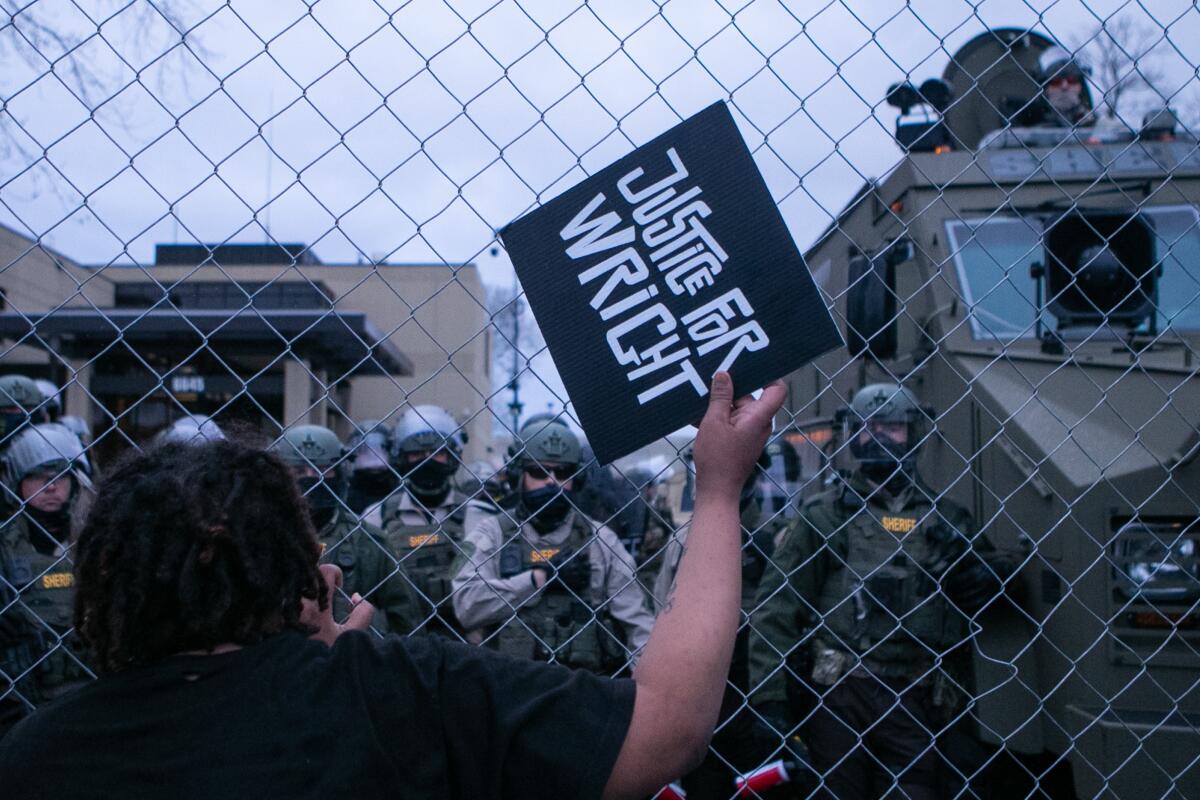
Brooklyn Center Mayor Mike Elliott has called for calm in the city.
“I share our community’s anger and sadness and shock, and my message to all who are demanding justice for him and for his family is this: Your voices have been heard,” Elliot said at a news conference. “The eyes of the world are watching Brooklyn Center and I urge you to protest peacefully and without violence. Let us show the best of our community.”
The charges were filed by the Washington County Attorney’s Office even though Brooklyn Center is in Hennepin County. That county’s attorney’s office referred the case to Washington County under an agreement used for cases involving police killings.
On Wednesday, hours after Potter’s arrest, a mix of emotions came from this community lined with single-level homes and manicured lawns.
Prince Wehye, 35, stood gazing at a memorial for Wright, where a large wooden fist stood surrounded by flowers, balloons and LED candles. He’d been there by himself, at the corner of 63rd Street North and Kathrene Drive, for nearly an hour.
“It’s about accountability,” Wehye said when asked about the charge against Potter. “This is just a slap on the wrist. It’s like a formula, and I’m sick of it, really sick of it.”
On his lunch break from work, Lamark Taylor, 52, parked his car and walked over to the makeshift memorial. Wright’s shooting made him think of his own children, who are 18 and 19.
“Well, at least they’re charging her,” Taylor said of Potter. “I’m thankful for that. We’ll see what happens later on.”
Across from the Police Department, Emily Johnson stood on the side of the road holding a cardboard sign with the last names of Jamar Clark, Philando Castile, George Floyd and Wright, along with the words “This is MN.” All four are Black men who were killed by police in the Twin Cities area in recent years.
“I’m pleasantly surprised that there were charges,” said Johnson, 33, a white woman who is a social worker at a nearby school. “But, yeah, still feeling like it’s not enough. These are just charges. We’re seeing that with the Chauvin trial — how much more damage will be done?”
In downtown Minneapolis, the defense for former Officer Chauvin presented its case for a second full day this week. This is the third week of testimony. The trial could go to jurors by early next week.
Eric Nelson, Chauvin’s defense attorney, has argued that his client’s use of force was necessary and that Floyd’s use of drugs contributed to his death.
Nelson called on Dr. David Fowler, a retired forensic pathologist. Fowler told jurors he believed Floyd died due to a number of factors.
“In my opinion, Mr. Floyd had a sudden cardiac arrhythmia or cardiac arrhythmia due to his atherosclerotic and hypertensive heart disease,” Fowler said.
Nelson also asked Judge Peter Cahill for a judgment of acquittal on Wednesday, arguing that the state had failed to submit sufficient evidence that Chauvin’s use of force in restraining Floyd led to his death.
Cahill denied the request.
Lee is a Times staff writer and Ganguli is a special correspondent.
More to Read
Sign up for Essential California
The most important California stories and recommendations in your inbox every morning.
You may occasionally receive promotional content from the Los Angeles Times.
